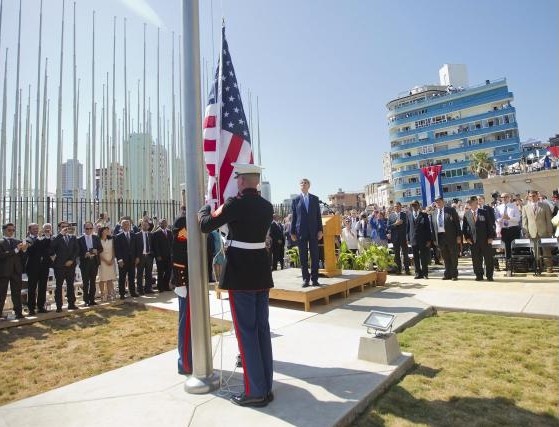HAVANA, (Reuters) – U.S. Secretary of State John Kerry declared a new era in relations as he celebrated restored diplomatic ties in Havana today, but he also urged political change in Cuba, telling Cubans they should be free to choose their own leaders.
The first U.S. secretary of state to visit the Caribbean island in 70 years, Kerry presided over a ceremony raising the U.S. flag over the newly reopened American embassy.
The event at the seaside building was another symbolic step in a path opened last December when President Barack Obama and President Raul Castro announced they would seek to restore diplomatic ties, reopen embassies and work to normalize ties.
Kerry made plain that despite the historic opening between the Cold War-era foes, Washington would continue to push for democratic reform.
“We remain convinced the people of Cuba would be best served by a genuine democracy, where people are free to choose their leaders,” Kerry said, speaking in a country where the Communist Party is the only legal political party, the media is tightly controlled, and political dissent is repressed.
“We will continue to urge the Cuban government to fulfill its obligations under U.N. and Inter-American human rights covenants – obligations shared by the United States and every other country in the Americas,” Kerry said.
His words were translated precisely into Spanish and broacast live on Cuban state television.
Kerry spoke on a podium outside the embassy, moments before U.S. Marines raised the American flag there for the first time in 54 years.
Cuba has long defended its style of government in the face of U.S. hostility and pressure to change since the 1959 revolution that brought Fidel Castro to power.
Obama, a Democrat who has come under heavy criticism from Republican opponents and some in his own party over the policy shift toward Cuba, has said the rapprochement is partly because decades of efforts to force change by isolating the island did not work.
Three retired Marines who last lowered the flag in 1961 took part in Friday’s ceremony, handing a new flag to the Marine Color Guard. As the flag was raised, there were loud cheers and applause from the crowd of U.S. and Cuban dignitaries and longtime proponents of U.S.-Cuban engagement, and from people watching from neighboring balconies.
The event took place nearly four weeks after the United States and Cuba formally renewed diplomatic relations and upgraded their diplomatic missions to embassies. While the Cubans celebrated with a flag-raising in Washington on July 20, the Americans waited until Kerry could travel to Havana.
CRITICISM OVER DISSIDENTS

U.S. Secretary of State John Kerry (C) stands with other dignitaries as members of the U.S. Marines raise the U.S. flag over the newly reopened embassy in Havana, Cuba, August 14, 2015.
Reuters/Pablo Martinez Monsivais/Pool
Kerry will meet Cuban dissidents at the U.S. embassy residence in Havana later on Friday. But dissidents were not invited to the flag-raising in deference to the Cuban government. That drew complaints from opponents of the opening to Cuba, who say the Cuban government has made no concessions in exchange for diplomatic ties.
“Secretary Kerry’s visit is especially insulting for Cuba’s dissidents,” said Jeb Bush, a Republican candidate for next year’s U.S. presidential election.
“That courageous Cubans whose only crime is to speak out for freedom and democracy will be kept away from the official ceremony opening the U.S. Embassy is yet another concession to the Castros,” the former Florida governor said.
Overnight, workers attached a sign reading “Embassy of the United States of America” above the entrance of the building, accompanied by a U.S. seal.
Three classic American cars like those that still ply the streets of Havana were parked on the street behind the podium where Kerry spoke: a 1955 and a 1957 Chevrolet Bel Air and a 1959 Chevrolet Impala, from the year of the revolution that brought Fidel Castro to power.
Fidel Castro handed over power to his brother, Raul Castro, in 2008 because of poor health.
